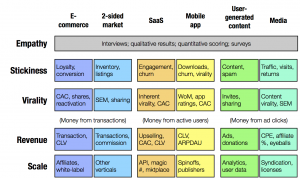
![]()
![]()
![]() Some rights reserved by nhanusek
Some rights reserved by nhanusek
[Editor’s Note: This is a guest post by Chris Maeda LinkedIn Follow @xmaeda. Full disclosure, Chris as he mentions in the article, was an investor in Influitive, a company I co-founded. Chris is the CEO of Brick Street Software and an active angel investor. He’s looking for deal flow and we will be hosting a series of Founders & Funders in Toronto, Halifax, Vancouver and a few other cities to connect those that start high tech, high potential growth companies with those that fund them. Subscribe to Founders & Funder$ notification list for updates. If you’re looking to connect with Chris, my advice, is to reach out to him on AngelList, but hey, it worked for me and I’m a sucker for patterns.]
I’ve been an angel investor in Toronto since 2011. Towards the end of the dot.com days, I traded my SOMA loft for a New Hampshire cottage, partly as a by-product of some public company M&A transactions. I began investing with a New Hampshire angel group in the mid-aughts. I like living in NH, but the deal flow you see there is quirky. There weren’t very many software deals, and New Hampshire has a lot of trees and cows, so the angel group ended up looking at non-software deals, like online wood pellet distributors and dog yogurt manufacturers. When I was hearing the dog yogurt pitch, I had a what-the-hell-am-I-doing-here moment of clarity and quit the angel group.
Then two things happened. First, my company, Brick Street Software, decided to set up a customer support center in Toronto so I started coming to Toronto for business on a regular basis. Second, Influitive was advertising a round on AngelList. I met the Influitive founders (Mark Organ and David Crow) and, after verifying that they were not planning to enter the dairy products business [Ed. Note: I have a dairy allergy so I’m kind of anti-dairy], I invested in their pre-venture rounds and joined their board. I recently invested in a second Toronto company and am working on a third. I’m starting to see patterns for why Toronto is great place to invest.
- Activity, talent pool, and competition:
As I tell my American friends, Toronto is the New York and Los Angeles of Canada. So almost everything that happens, happens in Toronto. I’m sure I just ticked off a bunch of people outside of the GTA, but this is reality when viewed from the US. The software talent pool is pretty good; there are lots of startups but everyone complains about a shortage of capital. So this forces Canadian entrepreneurs to have a bootstrap mentality and means that valuations are not outrageous. The seed funding bubble has come to Canada but its not as gassy as the US. - Lots of public money and assistance:
the US does not have SR&ED credits, IRAP grants, refundable HST, or the network of publicly-funded innovation centers that you find in Ontario. A Toronto company that I’ve invested in has probably raised as much money in grants as it has from investors. This means the Canadian government is reducing my dilution and (hopefully) goosing my investment returns. Thanks, guys. - Corporate customers are nearby:
Many of the large corporate buyers are headquartered in Toronto. I rode along on a sales call to a large Canadian company. I usually have to get on an airplane for something like this; in Toronto I can take a cab. I can even take transit if I’m not in a hurry. - Better for international business:
There are a number of little things that make Canada a good place for an international business hub. For a variety of reasons, Canadian employees are less expensive than Americans, and the NAFTA treaty makes it easy for Canadian companies to expand into the US with minimal US headcount. You can have bank accounts in foreign currencies (e.g. US Dollars and Euros). Finally, and perhaps most importantly, the Canadian market is so small that startups have to plan for international expansion from day 1.





